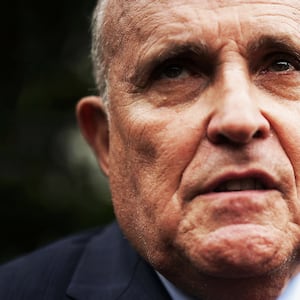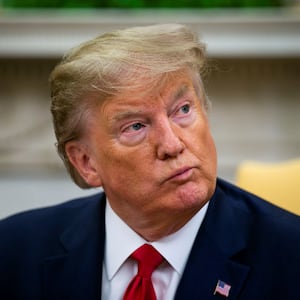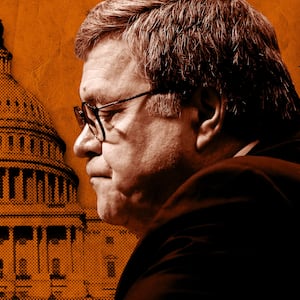The events surrounding President Trump’s gross misconduct toward the president of Ukraine, and the elaborate efforts to hide it from Congress, confirm that Attorney General William Barr has turned the Department of Justice into a tool for undermining the United States justice system. During his now infamous July 25 call, Donald Trump repeatedly suggested that Ukrainian President Volodymyr Zelensky work directly with Barr in commencing an investigation of Democratic presidential candidate Joseph Biden.
The DOJ issued a statement denying that Barr joined Trump’s personal lawyer, Rudy Giuliani, in trying to dig up dirt on Trump’s potential 2020 opponent. Yet it is hardly surprising that Trump might call upon the nation’s chief law enforcement officer to serve as his political dirt-digger. In a memorandum he wrote to then-Deputy Attorney General Rod Rosenstein before becoming attorney general, Barr asserted that the president has broad constitutional authority to stop or start law enforcement investigations for most any colorable reason; he also publicly endorsed Trump’s call to investigate Hillary Clinton based on conspiratorial allegations raised in a book sponsored by Steve Bannon. Furthermore, Barr has tasked a federal prosecutor with investigating speculative claims regarding the “origins” of the Russia investigation. It is therefore hardly surprising that Trump would expect his attorney general to willingly join in an effort to pressure Ukraine to gin up an investigation of a political opponent.
In any event, while Barr may not have joined in the Trump/Giuliani scheme to pressure Ukraine to produce kompromat, the attorney general plainly enjoined the DOJ to violate federal law by preventing Congress from receiving the whistleblower’s complaint. This misconduct constitutes a culpable cover-up scheme, despite attempts to gussie it up with weak claims of legality.
ADVERTISEMENT
For reasons that are now obvious, the Intelligence Community’s inspector general determined that the anonymous whistleblower’s complaint regarding Trump met a statutorily defined “urgent concern” standard. After that determination, under the governing statute, the Director of National Intelligence was required to deliver the complaint to the House and Senate Intelligence Committees.
Barr’s DOJ, however, instructed the DNI to second-guess the IG and keep the complaint secret from Congress, as set forth in an Office of Legal Counsel opinion grounded on the theory that the president’s misconduct fell outside the scope of the whistleblower provision because it did not concern an “intelligence activity.” The problem is that neither Barr’s DOJ nor the DNI had the authority to embargo the complaint. To the contrary, the governing statute gives authority to make the relevant determination to the inspector general, and does so precisely because of his independence from the political pressures faced by cabinet officers.
With the release of the memo of the Zelensky call, it is now painfully clear why Barr’s staff manipulated the law to justify hiding the whistleblower complaint from Congress: It was gravely damaging to the president, and Barr views the primary job of the DOJ to be protecting Trump, regardless of the nature of his misconduct. In an apparent effort to demonstrate Barr’s bona fides, the DOJ has stated that, while the DOJ was ordering the DNI to hide the whistleblower’s complaint from Congress, it was also dutifully investigating whether the president’s solicitation of dirt from a foreign country to assist in his re-election was a violation of campaign finance laws, an issue that also arose in connection with the Russia investigation.
Yet the DOJ came to the conclusion that Trump was in the clear, a determination that is entirely unsurprising given that Barr shares Trump’s extreme skepticism with the very notion of presidential criminal liability. Indeed, in that same memo to Rosenstein, Barr argued that a president has broad authority to obstruct investigations into his own crimes, a view he put into practice in his unsolicited declaration of Trump’s innocence after receiving the Mueller Report.
Leaving to one side the merits of Barr’s most recent exoneration of Trump, the question arises why the attorney general and his department were engaged in such a review in the first place. DOJ regulations provide for the appointment of a special counsel when the attorney general faces a conflict of interest or there are other extraordinary circumstances and it is in the public interest. It should have been plain to Barr that a special counsel, not Barr or prosecutors reporting to him, should be appointed to undertake a comprehensive investigation of this new, and grave, instance of potential presidential criminality. Indeed, given that Barr was repeatedly invoked by Trump during his call with Zelensky, there may well have been substantial grounds for Barr to recuse himself completely from the matter.
Yet Trump certainly had no reason to fear that Barr would follow the rules of the DOJ by recusing himself or handing the matter off to a special counsel; indeed, as Trump has repeatedly made clear, he hired Barr because there was no chance that his new attorney general would make the same mistakes as Jeff Sessions by even thinking about ever placing the rule of law above the interest of the president.








